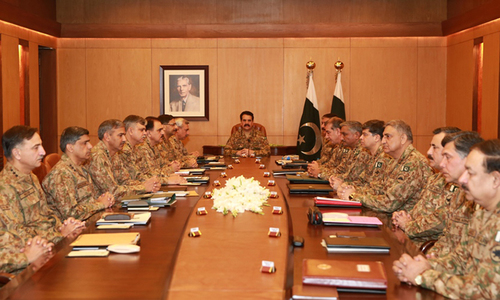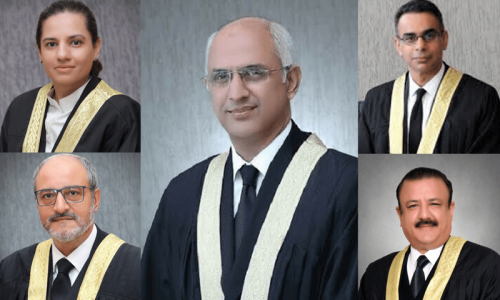THOSE in favour of negotiating with the outlawed Tehreek-i-Taliban Pakistan mistakenly believe that the group is a legitimate insurgent movement. The Afghan Taliban see them as a comparable entity, deserving of talks with the Pakistani state, citing their own negotiations with the US as a precedent.
Pakistan’s approach to talks with the TTP or similar militant groups has been consistent — falling into the category of the same flawed rationale. The TTP does not meet the criteria of a popular insurgent movement that would merit political engagement.
The TTP was an abrupt reaction to the post-9/11 situation, where the militant and religiously motivated political parties had felt a religious obligation to support the Taliban and Al Qaeda in the context of the US-led invasion of Afghanistan. Tribesmen from former Fata and Pata regions came forward on the call of the religious political parties. These parties played both sides, ie, the establishment and militants, leaving the tribesmen trapped. The militant groups that were close to the establishment faced disintegration on the question of jihad, and many joined the Al Qaeda camp of global jihad and later formed an umbrella organisation, the TTP.
The process was not as simple as described, but the TTP was merely a reaction to the situation that evolved in the region after 9/11. It was the state that had mishandled the situation, and Al Qaeda and like-minded militant organisations took full advantage of the situation. The establishment might have more significant designs in mind; usually, sceptical minds argue that the militant infrastructure inside Pakistan had provided an excuse for the presence of the Taliban on its soil.
The mother of all questions is yet to be answered: what has Pakistan achieved by supporting the (Afghan) Taliban resistance in Afghanistan? If the purpose was to restrict the Indian role in the region and instal a friendly government in Afghanistan, it was the costliest covert war any nation had fought in recent history. Pakistan’s war against the TTP failed to achieve its strategic purposes, eroded the social fabric, destroyed the economy, and brought the country to the verge of becoming a fragile state.
If the TTP had been abandoned by the Taliban, much of their strength would have evaporated.
History will determine where the power elites made mistakes, and will evaluate the damage done to state and society. Whatever the case, the reaction to the invasion of Afghanistan was strong, and it spawned decades of armed resistance by Islamist militants, which was not expected. During these decades, the TTP underwent several transformations, from a terrorist movement to organised armed resistance against the state.
The TTP tried out every ideological domain. It remained involved in the brutal sectarian killings of members of the Shia community, and targeted marginalised religious communities. It contributed equally to global terrorism campaigns alongside Al Qaeda.
Wali Mehsud, the organisation’s current head, linked the insurgency with history and gave it a nationalist flavour. He linked the TTP with the anti-British resistance of Mullah Powindah (1863-1913), Haji Sahib of Turangzai (1858-1937), and the Faqir of Ipi (1897-1960) and portrayed the Pakistan military as a custodian of the British legacy. However, reconstructing the organisation’s ideological and political views has not helped the TTP much, as it has failed to nurture an attractive narrative.
In fact, the TTP does not qualify as an insurgent movement resistance to negotiate peace with, as it does not enjoy popular support in any part of the country, including its previous headquarters in Waziristan. Insurgency is a politico-military struggle by non-state actors against the state that seeks to replace a central authority. However, in the merged tribal districts, rights movements and political parties are already active, demanding their rights in non-violent ways and within the constitutional framework; their presence denies space to the TTP.
The clergy and organisations will not go against the state to support the TTP even if they have sympathies for them. The merged districts are not ready to have the TTP return to their areas. The Pashtun Tahaffuz Movement offers strong resistance to the TTP. Literacy and exposure to the outside world that the tribes received during the military operation created strong feelings against the TTP and strengthened demands that the state fulfil its promises of development in the area. The grievances in the merged districts of KP are genuine, but the TTP cannot exploit these to generate public support for itself, as the locals still trust the state institutions.
According to UN and other estimates, TTP fighters in Afghanistan number 4,000 to 6,000. If families and non-combatants of the TTP human resource are counted, the figure would go up to 30,000. The number of fighters, if allowed to use Afghan soil, would pose a considerable challenge.
The TTP resistance cannot be compared with the Baloch resistance, which has roots and support within certain regions in Balochistan, helping it sustain its operations. If the TTP had been abandoned by the Afghan Taliban, much of their strength would have evaporated. This is the reason the state should continue to put pressure on the Afghan Taliban regime to restrict its ties with the TTP terrorists.
Balochistan needs a political dialogue to be held amongst stakeholders to decide on talks with armed groups. The TTP is trying hard to conclude a deal with the Baloch insurgents and continuously shows empathy with missing persons and the Baloch cause. However, the TTP is a different case altogether. It is not an insurgency, nor does it enjoy popular support. If brought back to its native areas, it would create tribal feuds, trigger religious violence, and weaken the state’s writ.
The Afghan Taliban need to talk to the TTP mainly to convince them that peace in the region is inevitable for Afghanistan’s stability and progress. For Pakistan, a complete surrender of the TTP should be the only option. After the surrender, initiatives such as rehabilitation, reintegration, and resettlement of TTP members can be launched.
The writer is a security analyst.
Published in Dawn, June 16th, 2024
















































Dear visitor, the comments section is undergoing an overhaul and will return soon.